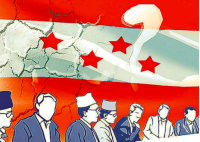Opinion
Time to talk
Ignoring the demands of the Madhesi parties does not bode well for long-term stability
Shreya Paudel
The first thought that crossed my mind after reading the news on the promulgation of the new constitution was, “Nakhaaun ta din vari ko sikaar, khaaun ta kaanchhaa baau ko anuhaar”. For those who have not yet heard this Nepali idiom, here’s a story to explain it: A man and his nephew go to the jungle for hunting. The duo is separated and the nephew hunts down an animal. The idiom refers to what the nephew thinks at that exact moment, “How can I not eat the hunt as this is the fruition of the whole day? But how can I eat alone while my uncle must be still out there in the jungle?”
The hunt, in this case, is the constitution, the nephew is the trioka—the Nepali Congress (NC), CPN-UML, UCPN (Maoist)—and the poor uncle who is still out there in the jungle are the Madhesi political parties. Therefore, as much as I acknowledge that this constitution is an outcome of many sacrifices of the entire nation, I am also mindful of the fact that a protester in Birgunj succumbed to a police bullet on the same day the constitution was promulgated.
Listen to the Madhes
The constitution is undoubtedly the fruition of nearly a decade-long political transition in Nepal. It was written by the Constitution Assembly, something our progressive ancestors could only dream of in 1951 after the end of the Rana oligarchy. The statute further institutionalises republicanism, secularism and paves the way to an amendable federalism. Yet, protests in the Madhes continue. Initially, many of us, at least I, did not understand the demands of the Madhesi parties. The recent protests sounded like a cluster of disgruntled ramblings.
But if Dipendra Jha’s, a prominent Madhesi activist, Facebook statuses are taken as a reference point, the demands of the Madhesi parties include the review of the delineation of the states, electoral constituencies proportional to the population and proportional representation of the Madhesis in the state structure. And by now over 40 people have died, many killed by the state and some by the protestors, for this cause. But the state has the greater responsibility to maintain peace and it should not target civilians driven by vengeance. If anything, the violence by the state provided the Madhesi leaders with another political agenda. Going through the photos that Madhesi friends have shared on social media, the protests in the plains are massive. This movement has already garnered support from many Madhesis on the ground.
On its part, the government has offered compensation to the families of the deceased, which is a good move.
The concerns of the Madhesis, however, are not limited to their dead family members.
While the three major parties might have a greater number of Madhesi lawmakers in the CA than the Madhesi parties, the Madhesi parties have the political custodianship of the Madhesi cause. And even though the issue of demarcation of states is complex—as Jhapa district, for instance, is claimed by competing movements, the Madhesis and supporters of Limbuwan—completely ignoring the demands of the Madhesi parties does not bode well for long-term stability.
Middle ground
Regarding the concern that the Madhesi leaders are influenced by the Indian state, it might as well be true to some extent. After all, the Narendra Modi government felt the need and the entitlement to send an emissary to ‘resolve’ an internal issue of its sovereign neighbour. But the involvement of India should not de-legitimise the genuine demands of the Madhesi people. For, it was not India that overwhelmingly voted for the Madhesi parties in the first CA. It is also not India that is taking bullets in their chest from the Nepali state for what they believe in: it is the Madhesi people of Janakpur, Bhardaha and beyond.
The way forward lies in between the rhetoric of the conflicting sides. While many of us appreciate that the Nepali Congress, UML and UCPN (Maoist) managed to promulgate the constitution and that they have repeatedly called the Madhesi parties to sit down for talks, they need to do more to create the ‘maahol’ (environment) for it. And such a maahol can be created by ordering the police to stop shooting at protestors with live ammunition. As for the Madhesi parties, there is no extra-constitutional way out of this mess. Protests in the streets cannot continue forever and lynching the opposition will not help anyone. They need to come to the negotiation table sooner or later. And many Nepalis are waiting for a better-lit Dipawali when the Tarai will celebrate the constitution along with the rest of the country.
Paudel is a student of MSc Conflict Studies at the London School of Economics and Political Science




 19.12°C Kathmandu
19.12°C Kathmandu










